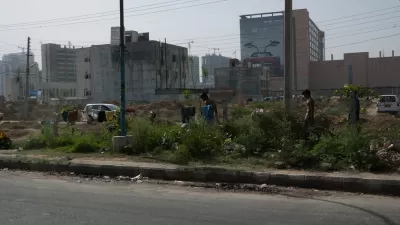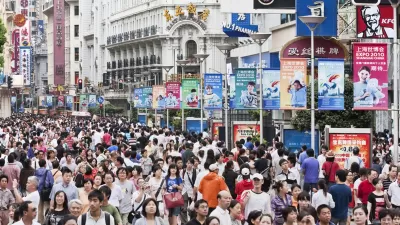Though China's cities have been growing exponentially, some argue it isn't urbanizing fast enough. Fearing Latin American-style slums, leaders have restricted migration. They're now being urged to ease controls to maximize agglomeration effects.
Though China's leaders have long sought to limit urban migration out of a fear of creating slums or "spurring centers of political opposition", according to "urbanization specialists" inside and outside outside of the country, "[t]he problem with Beijing, Shanghai and other Chinese megacities...is that they aren't even more densely packed—or better planned," writes Bob Davis.
"China's government hasn't bought into the bigger-is-better argument so far, but it is listening to new ideas. The country's new premier, Li Keqiang, who has made urbanization a focus of China's economic reform plans, said the government had received 500 proposals on the subject at a March meeting of the largely ceremonial parliament."
"'We have to let the market play a bigger role in the development of cities and dismantle barriers' to urban growth, said He Fan, a senior economist at the Chinese Academy of Social Sciences, the government's most prestigious think tank. 'People prefer to move to larger cities because there is more opportunity there.'"
"Yukon Huang, a former China director for the World Bank, estimates that if such restrictions were eliminated, about 60% of China's population would now live in cities, rather than the current 52.6%."
FULL STORY: Beijing Puzzles Over Urban Growth

Maui's Vacation Rental Debate Turns Ugly
Verbal attacks, misinformation campaigns and fistfights plague a high-stakes debate to convert thousands of vacation rentals into long-term housing.

Planetizen Federal Action Tracker
A weekly monitor of how Trump’s orders and actions are impacting planners and planning in America.

In Urban Planning, AI Prompting Could be the New Design Thinking
Creativity has long been key to great urban design. What if we see AI as our new creative partner?

King County Supportive Housing Program Offers Hope for Unhoused Residents
The county is taking a ‘Housing First’ approach that prioritizes getting people into housing, then offering wraparound supportive services.

Researchers Use AI to Get Clearer Picture of US Housing
Analysts are using artificial intelligence to supercharge their research by allowing them to comb through data faster. Though these AI tools can be error prone, they save time and housing researchers are optimistic about the future.

Making Shared Micromobility More Inclusive
Cities and shared mobility system operators can do more to include people with disabilities in planning and operations, per a new report.
Urban Design for Planners 1: Software Tools
This six-course series explores essential urban design concepts using open source software and equips planners with the tools they need to participate fully in the urban design process.
Planning for Universal Design
Learn the tools for implementing Universal Design in planning regulations.
planning NEXT
Appalachian Highlands Housing Partners
Mpact (founded as Rail~Volution)
City of Camden Redevelopment Agency
City of Astoria
City of Portland
City of Laramie




























